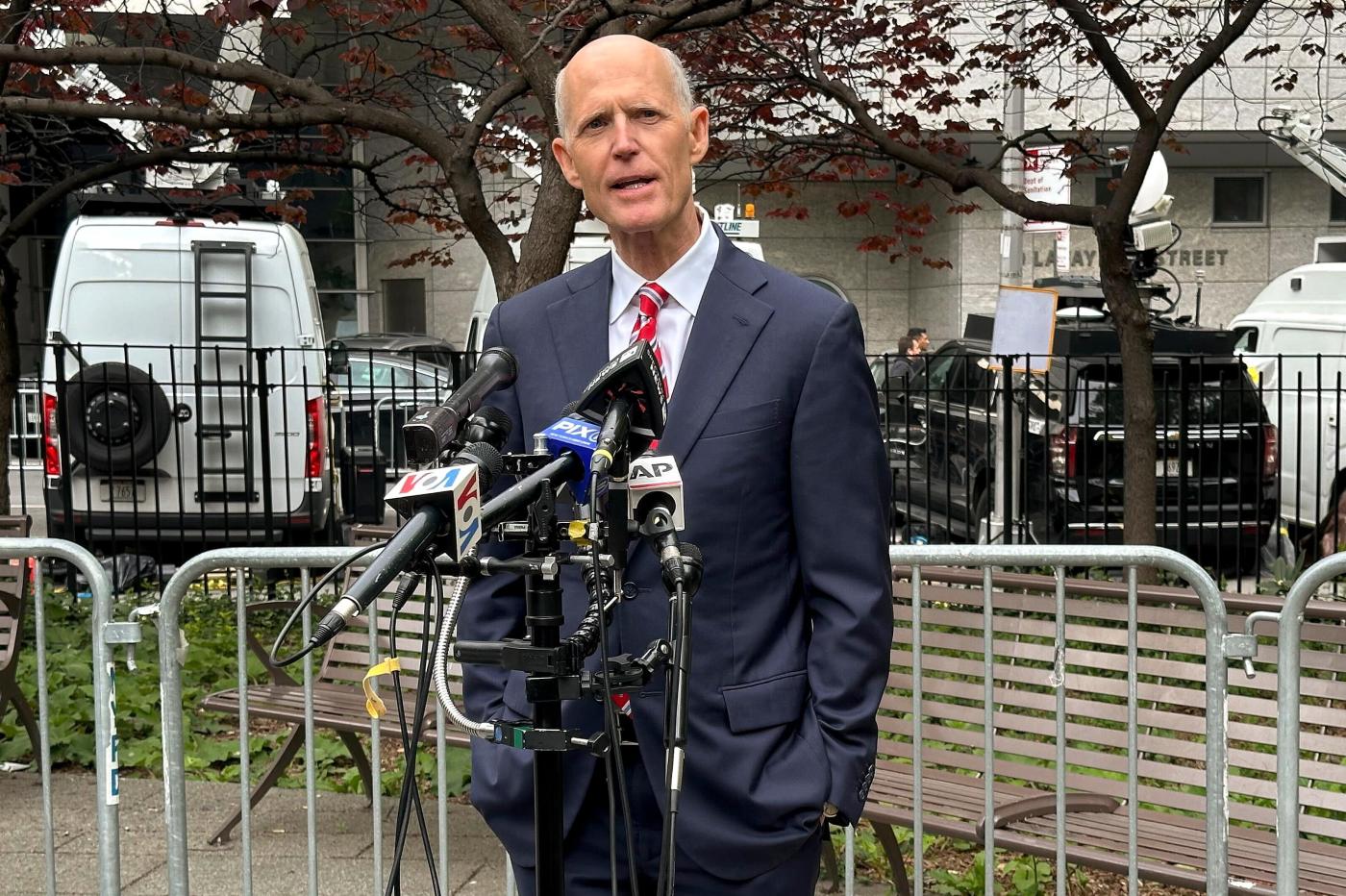
Trump is limited in what he can say about his court case. His GOP allies are showing up to help
By ADRIANA GOMEZ LICON (Associated Press)
Former President Donald Trump is limited in what he can publicly say as he fights charges that he made payments to a porn actor to illegally influence the 2016 election. But he’s getting help from some GOP allies who are glad to show up and talk.
U.S. Sen. Rick Scott of Florida was the latest surrogate to accompany Trump, joining him Thursday for the 14th day of his hush money trial in New York. Last week, it was Texas Attorney General Ken Paxton who joined the presumptive GOP presidential nominee.
The Republicans’ courtroom presence can help Trump connect with constituents while he’s stuck in court and feeling the pressure of a gag order placed on him by the judge. Both Scott and Paxton have been through legal troubles of their own, and have railed against what they call politically motivated prosecutions — a message that echoes Trump’s own. And while having friends by one’s side is a common practice encouraged by attorneys to show support for defendants in court, it’s also a chance for Trump’s friends to publicly demonstrate their loyalty to the leader of the GOP.
Scott started his day Thursday as the 6 a.m. guest on the morning show “Fox & Friends.” He later entered the courtroom behind Trump and witnessed the tense exchange between Stormy Daniels and Trump’s defense attorney as they were going over the alleged 2006 sexual encounter between the former president and the porn actor.
The senator filed into the first row of the courtroom gallery behind the defense table, joining Trump’s entourage, and spoke with Trump lawyer and spokesperson Alina Habba before taking a seat.
After an hour and a half, Scott left the courtroom and walked across the street to speak to news outlets. There, he commented on a a subject Trump has been ordered not to, bringing up Judge Juan Merchan’s daughter and saying she was a political operative who raises money for Democrats.
“This is just a bunch of Democrats saying we want to make sure that Donald Trump can’t talk,” Scott said. “Then they’ve got a gag order, so he can’t go campaign. They’ve got him holed up in a courtroom.”
The gag order prohibits Trump from making or directing others to make public statements about people connected to the case, including the judge’s family.
Scott denied his presence had anything to do with the gag order.
“No. I’m fed up,” he said. “This is just simply they don’t want this guy on the ballot.”
Paxton did not speak publicly when he joined Trump last week, but he gave interviews later to Fox Business and Newsmax about the trial, calling it “perversion of justice.”
“This is tyrannical, and to stop him from speaking out and defending himself and keep him from basically campaigning, I think is hard to believe and I hope the American people do not put up with this,” Paxton told Fox Business the day after.
David Weinstein, a legal analyst and former federal prosecutor, said Trump can’t directly or indirectly comment, adding that an indirect comment would include a friend saying something Trump shared or told. But surrogates like Scott are free to speak.
“They can say whatever they want to say. They are not bound by a gag order,” he said.
Weinstein said Trump is not only on trial for the crimes he is charged with, but he’s also before the court of opinion while trying to win an election.
“He can bring other people in, can show constituents of other states that he has the backing of other politicians,” he said. “This is a political and a public relations tactic. It’s got nothing to do with his defense.”
Trump’s attorneys have argued against the gag order, saying the former president should be allowed to respond to Daniels’ testimony. But Merchan on Thursday refused a request to modify it.
Gustavo Lage, a criminal defense attorney, said it is controversial as to what extent this gag order applies.
“I think the court would have a hard time saying that a third party can’t voice their opinion or their feelings about a trial,” Lage said.
As far as connecting with voters by bringing in surrogates and allies, Lage said that should not be relevant in court.
“I don’t think that is something the court could or should control as long as it doesn’t interfere with the administration of justice in the courtroom,” he said.


